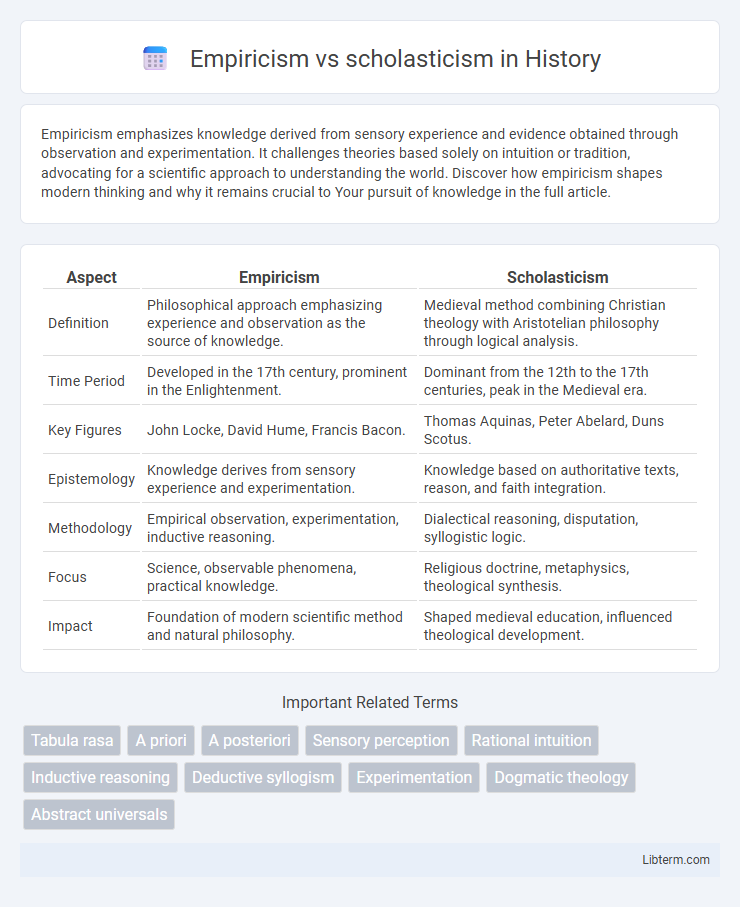Empiricism emphasizes knowledge derived from sensory experience and evidence obtained through observation and experimentation. It challenges theories based solely on intuition or tradition, advocating for a scientific approach to understanding the world. Discover how empiricism shapes modern thinking and why it remains crucial to Your pursuit of knowledge in the full article.
Table of Comparison
| Aspect | Empiricism | Scholasticism |
|---|---|---|
| Definition | Philosophical approach emphasizing experience and observation as the source of knowledge. | Medieval method combining Christian theology with Aristotelian philosophy through logical analysis. |
| Time Period | Developed in the 17th century, prominent in the Enlightenment. | Dominant from the 12th to the 17th centuries, peak in the Medieval era. |
| Key Figures | John Locke, David Hume, Francis Bacon. | Thomas Aquinas, Peter Abelard, Duns Scotus. |
| Epistemology | Knowledge derives from sensory experience and experimentation. | Knowledge based on authoritative texts, reason, and faith integration. |
| Methodology | Empirical observation, experimentation, inductive reasoning. | Dialectical reasoning, disputation, syllogistic logic. |
| Focus | Science, observable phenomena, practical knowledge. | Religious doctrine, metaphysics, theological synthesis. |
| Impact | Foundation of modern scientific method and natural philosophy. | Shaped medieval education, influenced theological development. |
Introduction to Empiricism and Scholasticism
Empiricism emphasizes knowledge derived from sensory experience and observation, forming the foundation of scientific inquiry and modern experimental methods. Scholasticism relies on rigorous dialectical reasoning and synthesis of classical philosophy with theological doctrine, prominent in medieval universities. This contrast highlights empiricism's focus on evidence-based knowledge versus scholasticism's systematic, faith-informed intellectual tradition.
Historical Context of Both Philosophies
Empiricism and scholasticism emerged during distinct historical periods, with scholasticism dominating medieval Europe from the 12th to the 17th century, emphasizing theological and philosophical synthesis based on Aristotelian logic and Church doctrine. Empiricism, gaining prominence during the Scientific Revolution in the 17th century, prioritized observation and experimentation as the foundation for knowledge, challenging the authority of scholastic methods. The historical shift from scholasticism to empiricism reflects broader cultural and intellectual transformations, including the rise of scientific inquiry and the decline of feudal and religious hegemony.
Core Principles of Empiricism
Empiricism centers on the principle that knowledge arises primarily from sensory experience and observation, emphasizing evidence over innate ideas or purely logical reasoning. This approach relies on experimentation and inductive reasoning to derive general principles from specific instances, contrasting with scholasticism's emphasis on established doctrines and deductive logic from authoritative texts. Key figures such as John Locke and David Hume advanced empiricism by arguing that the mind begins as a tabula rasa, acquiring knowledge through interaction with the environment.
Fundamental Tenets of Scholasticism
Scholasticism centers on the systematic integration of Christian theology with Aristotelian philosophy, emphasizing dialectical reasoning as a method to resolve contradictions and reconcile faith with reason. It upholds the authority of established texts, particularly the Bible and Church Fathers, asserting that truth is accessible through rigorous logical analysis guided by these sources. Fundamental tenets include the belief in innate ideas and universals, the hierarchical ordering of knowledge, and the use of disputation to clarify and defend doctrinal points.
Methods of Acquiring Knowledge
Empiricism emphasizes acquiring knowledge through sensory experience and experimentation, relying on observation and evidence as the foundation of understanding. Scholasticism depends on deductive reasoning, authoritative texts, and theological principles to interpret reality and establish truth. The empirical method prioritizes induction and practical verification, while scholasticism values logical analysis and synthesis of established doctrines.
Key Figures in Empiricism and Scholasticism
John Locke and David Hume stand as pivotal figures in empiricism, emphasizing knowledge through sensory experience and empirical evidence. Thomas Aquinas dominates scholasticism by merging Aristotelian philosophy with Christian theology, focusing on reason and faith's harmony. Francis Bacon also shaped empiricism, advocating scientific methods, while Peter Abelard influenced scholasticism with dialectical reasoning and theological inquiry.
Major Debates and Controversies
The major debates between empiricism and scholasticism centered on the sources and authority of knowledge, with empiricists advocating observation and sensory experience as the foundation of understanding, while scholastics emphasized reason and established doctrines rooted in Aristotelian philosophy and Church teachings. Controversies often revolved around the validity of inductive reasoning versus deductive methods, challenging scholastic reliance on abstract reasoning detached from empirical evidence. These debates shaped the evolution of scientific inquiry, ultimately fostering a shift towards empirical methodologies that questioned traditional scholastic frameworks.
Influence on Modern Science and Education
Empiricism, emphasizing observation and experimentation, laid the foundation for the scientific method, directly shaping modern science's reliance on evidence-based inquiry and empirical data analysis. Scholasticism contributed to education by promoting rigorous dialectical reasoning and systematic debate within medieval universities, fostering intellectual discipline and analytical frameworks still evident in today's liberal arts curricula. The interplay between empiricism's practical methodologies and scholasticism's structured logic fundamentally influenced contemporary scientific research and higher education pedagogy.
Comparative Analysis: Strengths and Weaknesses
Empiricism emphasizes knowledge through sensory experience, fostering scientific inquiry and practical experimentation but struggles with abstract concepts beyond direct observation. Scholasticism relies on reasoned argumentation grounded in established authority and tradition, excelling in systematic theological and philosophical analysis while often limiting innovation and empirical validation. The comparative strengths highlight empiricism's adaptability and evidence-based approach versus scholasticism's structured methodology and intellectual rigor, with weaknesses involving empiricism's occasional neglect of metaphysical questions and scholasticism's resistance to empirical challenges.
Conclusion: Lasting Impact and Contemporary Relevance
Empiricism's focus on observation and experimentation laid the foundation for modern scientific methods, emphasizing evidence-based knowledge over purely theoretical reasoning found in scholasticism. Scholasticism, with its rigorous dialectical approach and integration of Aristotelian philosophy, influenced medieval education and theological debate, preserving valuable logical frameworks. Both traditions continue to shape contemporary epistemology and academic disciplines, highlighting the enduring dialogue between empirical inquiry and conceptual analysis.
Empiricism Infographic

 libterm.com
libterm.com